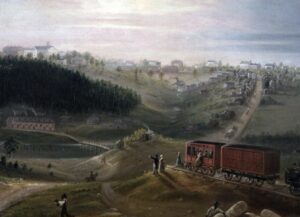UGA School of Social Work History
For more than five decades the UGA School of Social Work has found innovative ways to advance UGA’s mission of teaching, research and service. Since its founding in 1964, the school has conferred more than 9,000 degrees and grown from offering a single master’s degree in social work to a bachelor’s degree in social work (1975), a doctorate (1990) and a master of arts in nonprofit management and leadership (1999).
Throughout its history, the school has addressed discrimination and policies which affect equal access to resources, international human and civil rights, and the well-being of all populations.
In all it does, the school prepares graduates with the skills, know-how and passion to make this a better, more humane and just world for all.
Firsts
- First federal research center in the southeast focused on persistent poverty;
- First in Georgia to offer bachelor’s and doctorate degrees in social work;
- First in Georgia to offer a part-time master’s degree in social work;
- First in the southeast to offer a master’s degree in nonprofit management and leadership;
- First in the southeast to offer dual master’s degrees in social work and law, social work and public health, and social work and divinity;
- First in Georgia to offer graduate-level study away programs in social work;
- First in Georgia to offer an online course in military social work.
- The Center for Social Justice, Human and Civil Rights – UGA’s first hub for interdisciplinary social justice scholarship and community engagement.
Deans
- Charles A. Stewart (1964 – 1995)
- Bonnie Yegidis (1995 – 2003)
- Maurice Daniels (2005 – 2016)
- Anna Scheyett (2016 – 2021)
Complex Cloth – UGA SSW Building History
 The University of Georgia School of Social Work’s primary educational and administrative spaces in Athens, Georgia, are located in a remodeled antebellum fabric mill once known as the Athens Factory. The factory was first built in 1832, on formerly Native American land, to turn slave-produced cotton and wool into cloth. The mill used a mixture of enslaved and free labor, including child labor, to perform the sometimes-dangerous work of carding, spinning, and weaving cotton. Cloth produced at the factory was widely distributed, and used by the Confederate Army and by planters to clothe the people they enslaved.
The University of Georgia School of Social Work’s primary educational and administrative spaces in Athens, Georgia, are located in a remodeled antebellum fabric mill once known as the Athens Factory. The factory was first built in 1832, on formerly Native American land, to turn slave-produced cotton and wool into cloth. The mill used a mixture of enslaved and free labor, including child labor, to perform the sometimes-dangerous work of carding, spinning, and weaving cotton. Cloth produced at the factory was widely distributed, and used by the Confederate Army and by planters to clothe the people they enslaved.
As we train our social work students to promote social justice and human well-being, it’s important that we recognize our building’s relationship to historic systems of oppression, including slavery, Indian Removal, and child labor. At the same time, it’s also enlightening to see how social work in Athens first emerged to meet the needs of children and families working at this and other local mills. Jane McPherson, a School of Social Work associate professor and Director of Global Engagement, is exploring these histories in a project she calls “Complex Cloth.” The website for this project with photo and video content can be found here: https://complexcloth.org/
